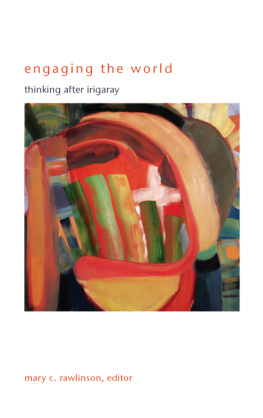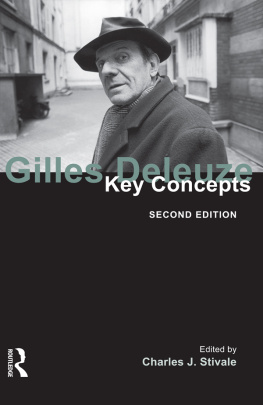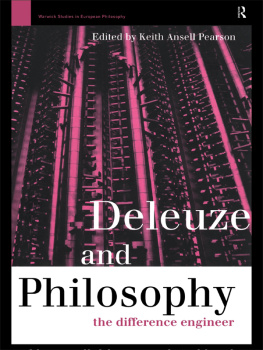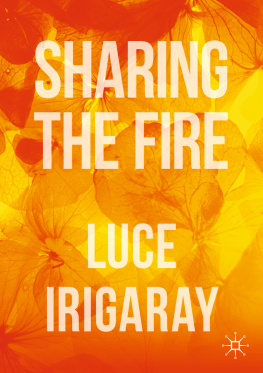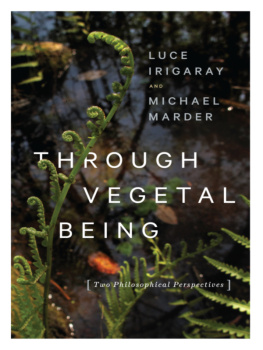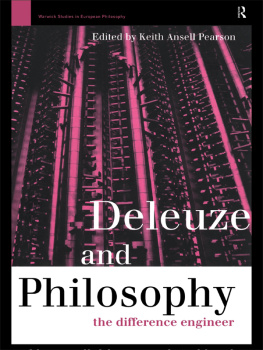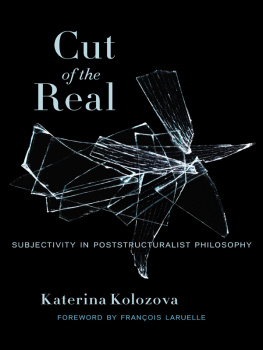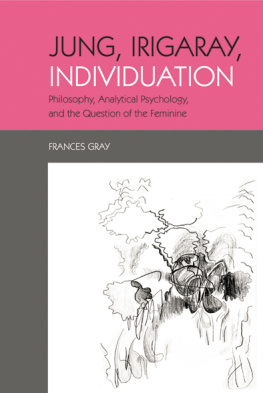ENGAGING THE WORLD
Thinking after Irigaray
Edited by
MARY C. RAWLINSON
S TATE U NIVERSITY OF N EW Y ORK P RESS
Cover art: If This Love Grew, Megan Craig, 2013
oil on panel, 46.5 48 inches
Published by State University of New York Press, Albany
2016 State University of New York
All rights reserved
Printed in the United States of America
No part of this book may be used or reproduced in any manner whatsoever without written permission. No part of this book may be stored in a retrieval system or transmitted in any form or by any means including electronic, electrostatic, magnetic tape, mechanical, photocopying, recording, or otherwise without the prior permission in writing of the publisher.
For information, contact State University of New York Press, Albany, NY
www.sunypress.edu
Production, Laurie D. Searl
Marketing, Fran Keneston
Library of Congress Cataloging-in-Publication Data
Engaging the world : thinking after Irigaray / edited by Mary C. Rawlinson.
pages cm. (SUNY series in gender theory)
Includes bibliographical references and index.
ISBN 978-1-4384-6027-7 (hardcover : alk. paper)
ISBN 978-1-4384-6029-1 (e-book)
1. Irigaray, Luce. 2. Feminist theory. 3. Philosophy. I. Rawlinson, Mary C., editor.
| B2430.I74E54 2015 |
| 194dc23 | 2015017383 |
10 9 8 7 6 5 4 3 2 1
CONTENTS
Mary C. Rawlinson
Fanny Sderbck
Rebecca Hill
Anne van Leeuwen
Mary C. Rawlinson
Elaine P. Miller
Claire Potter
Perry Zurn
Gail Schwab
Elizabeth Grosz
Margherita Long
Tara Rodgers
Mary Beth Mader
Cheryl Lynch Lawler
Britt-Marie Schiller
Sara Beardsworth
ACKNOWLEDGMENTS
The editor would like to thank Caleb Ward, Eva Boodman, and Sara Mac-Namara for their excellent work copyediting the manuscript.
Many thanks to Tina Chanter, the editor of the SUNY Series in Gender Theory, for her continuing support of the Irigaray Circle.
On behalf of the contributors, the editor would like to express our profound thanks to Luce Irigaray, whose work has inspired and nourished us all. We hope that she will find this volume some small payment toward our immense debt.
INTRODUCTION
Mary C. Rawlinson
The essays in this volume explore the opportunity and task opened up by Luce Irigarays thought on the irreducibility of sexual difference. Each essay follows Irigaray in engaging the world, deploying the resources of her work toward a rethinking of philosophical concepts and commitments to expose new possibilities of vitality in new forms of relationship to nature, to others, and to oneself.
Irigarays writings reinterpret the history of philosophy in light of sexual difference, rethinking philosophys basic concepts under the figure of an indelible twoness or multiplicity that cannot be absorbed by the logic of the same. At the same time, her work addresses the most pressing social and political issues of our time: the threat of nuclear catastrophe, environmental degradation and climate change, AIDS and other health crises, war, domestic violence, racial and ethnic violence, social and economic inequity, the failure of democratic processes, and the commodification of the body and human relationships under the unconditional power of money (Irigaray 1993a, 76). Addressing these crises, Irigaray argues, will require more than the redistribution of goods or changes in law and public policy. She links these ills directly to the philosophical repression of sexual difference and to the hegemony of Man as the figure of the human. It has always been men who spoke and, above all, wrote: in science, philosophy, religion, politics (Irigaray 1993c, 121). Currently, the discourse of the universal belongs to a masculine imaginary authorizing the laws of property and sexual propriety, the mastery of nature, war, and the regularized violence of sovereign power. These narratives have erased sexual difference, subjected the generativity of women to the interests of property and capital, and denied women a voice in the councils that determine the future. In Irigarays analysis, our current crises originate here.
Engaging the world to promote life will require changing the laws of language and the conceptions of truths and values structuring the social order (Ibid., 22). Justice depends on remaking the ideas and narratives in which identity is constituted. It depends on changing the laws governing who can speak and what can be said. For Irigaray, achieving justice is as much a philosophical as a political task. As guardians of the universal, philosophers must undertake work for the universal that has an individual and collective utility (Irigaray 1993b, 14647). Rethinking the universal as multiplerecognizing the experiences of women and other silenced and marginalized groups as sources of the universal in human experienceopens up the possibility of discovering new figures of agency and identity more adequate to address the urgent threats to vitality in our time.
The essays in the first section rethink the fundamental philosophical concepts of time, space, and universality in light of Irigarays analysis of the irreducibility of sexual difference. Each essay demonstrates how undertaking this philosophical task can provide new possibilities of identity and new ways of being together to promote life.
In her essay , Fanny Sderbck explicates Irigarays account of woman as homeless. Cut off from her beginnings through the lack of any relation to the mother, she has no origin of her own. Through a close reading of Irigarays reading of Platos myth of the cave, Sderbck demonstrates that this homelessness or lack of place also constitutes a timelessness . Following Irigaray, Sderbck shows how a return to beginnings might overcome a repetitive logic of the same in order to restore the vitality of becoming and sexual difference. Sderbck develops her own idea of revolutionary time based on maternal regeneration as a figure of immortality embodied in the flesh.
Reading Irigaray in relation to Avital Ronell, Rebecca Hills essay, , develops a critique of the concept of spatial propriety or proper place. Hills argument undermines both the domination of woman by man as his place of procreation and the hegemony of the modern nation state as the proper spatialization of politics. In a close reading of Irigarays reading of Aristotles analysis of space, Hill shows how Aristotles definition of space as a static container is subverted by the openness, porosity, and fluidity of a womans body. A womans body is mobile, without fixed borders, and able to accept multiple other bodies within. Rethinking place as interval or threshold privileges the between over fixed positions or separate beings. The mobility of the interval forestalls any attempt to master place and time. In doing so, it subverts the aggression associated with the possession of the maternal body or the policing of borders.

